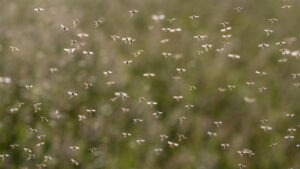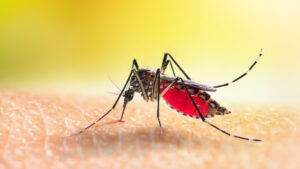By Mark Booth, Newcastle University
It’s a sunny day. Look out of your window. See anything unusual flying by? Look closely. There are midges, and they are not friendly.
Some of them are carrying a virus of sheep and other animals called bluetongue. You are not personally at risk of bluetongue, but farming systems are vulnerable.
Bluetongue is a problem in many countries and, as the climate changes, is expected to spread further, particularly in central Africa, the United States and western Russia. The first cases in the United Kingdom were detected in 2023.
Bluetongue is one of many infectious diseases likely to be affected by climate change. As part of the World Health Organization’s task team on climate change, malaria and neglected tropical diseases, I recently contributed to a review of climate change, malaria and over 20 neglected tropical diseases.
We found that most mathematical models pointed to global changes in the transmission of some mosquito-borne diseases like malaria and dengue. For most other parasites, there was little or no evidence. We simply don’t know what to expect. A major issue is that climate change is creating great uncertainty in the forecasting and prediction of where and when infections might occur.

When you think about climate change, you may be thinking big. Huge and significant changes to the planet. Ice sheets melting, large-scale flooding, massive wildfires. But everything, no matter how big or small, is going to be affected.
Each of those midges you might see is affected by the climate. So is every other organism that lives in the same area. Climate change is a global phenomenon with very deep and local impacts.
The key point here is that every organism will be affected in different ways. What matters to a midge is very different to what matters to a cow or a human. Organisms may or may not thrive under a specific local change in climate for many different reasons, depending on their physiology and natural history.
It is this variable impact at a very small scale that makes it harder to predict what will happen in the future to local ecosystems. By extension, it is difficult to predict what will happen at any other scale.
As we face the reality of climate change, building resilience and restoring healthy ecosystems is crucial. A biodiverse environment contains many types of organism: plants, animals, fungi. And parasites.
They interact through what is known as the food web, a collection of all the different food chains in an ecosystem. At the top are apex predators such as wolves and eagles. Below are a mix of producers (plants) and consumers (animals like fish or mosquito larvae).
New niches
There is a lot of debate among researchers about whether, and how, biodiversity links to parasite transmission to humans. What might happen depends on both the starting point and what changes are made.
Imagine introducing a pond in a garden, to attract insects. Now put some fish in the pond. What about some vegetation? Next, simulate global warming by installing a water heater. Each change to the pond creates or removes new niches and alters the structure of the food web.

When midges, mosquitoes, ticks or other carriers of disease move into a new area, a suitable niche must be available. Efforts at conservation such as rewilding landscapes, agroforestry farming practices and the creation of more urban parks all increase biodiversity and create more niches.
A recent example comes from Italy, where habitat restoration has likely caused the reappearance of malaria mosquitoes for the first time in 60 years.
Each new niche is like an advert. Malaria mosquitoes prefer woodland and ponds and feed at night. Dengue mosquitoes prefer urban environments, small containers of water and bite during the day. If the needs of both parasites and hosts are met by the niche, they might move in.
Increasing biodiversity may therefore be a double-edged sword. It facilitates planetary health. It promotes sustainable development. But habitat restoration may also help create conditions, alongside global warming, for invasive species and parasite transmission – if we are not careful.
There are so many factors to consider. It might appear too complex to do anything to prevent the spread of mosquito-borne infections like dengue and West Nile virus into new areas. Should we just slap on the insect repellent and hope for the best?
No. Our efforts should start but not end with repellent. It will take a unified and collaborative effort across communities, organisations and governments to build resilience.
How do we stay ahead? By increasing awareness, collecting more data, more timely decision making and climate-resilient health systems. There are already projects underway to improve forecasting tools.
Citizen science has an important role to play. The new Mosquito Scotland project encourages people to identify mosquitoes and report their sightings. Working together like this to tackle climate change and its effects on parasite transmission will help hundreds of millions of people live better lives now and in the future.
Mark Booth is a senior lecturer in parasite epidemiology in the School of Natural and Environmental Sciences at Newcastle University.
This article is republished from The Conversation under a Creative Commons license. Read the original article.
Sign up for The Invading Sea newsletter by visiting here. If you are interested in submitting an opinion piece to The Invading Sea, email Editor Nathan Crabbe at ncrabbe@fau.edu.



